- HOME
- Alumni News
- Activity Reports
- Jamna’s Activity Report
Activity Reports
Jamna’s Activity Report
CIL KATHMANDU
Progress Report: Month Of December 2018
Introduction of organization
Introduction of organization CIL-Kathmandu is a completely non-profitable and non-political, self-help organization run by and for persons with disabilities. It is a non-governmental organization established to work for the promotion and protection of the rights of persons with disabilities (PWDs) through the concept of independent living. The term "Independent Living" as defined by people with disabilities does not mean doing things for you or living on your own. It means having choice and control over the assistance and or equipment/assistive devices needed for daily life and having access to amenities that society has to offer such as housing, transport, health services, employment, as well as entertainment, education and training opportunities. Independent Living (IL) is a vision, a philosophy and a movement of persons with disabilities to promote and protect the human right of PWDs.
Independent Living Center, Kathmandu (CIL-Kathmandu) is working to promote and establish the concept of independent living in Nepal with the support of Ministry of Women Children and Social Welfare, Iruka NPO Center for Independent Living, Okinawa, JICA-Okinawa and Australian Volunteers Program, PlaneteUrgence and local government of Nepal.
The month of December consisted of a busy schedule for accomplishing major advocacy activities on accessibility and production of assistive device within the country, peer counseling, independent living programs and knowledge sharing programs. In addition to these activities, ina coalition with National Federation of Disabled Nepal-NFDN and other Disabled Peoples Organizations and Nippon Foundation, CIL-Kathmandu facilitated aknowledge sharing program and inclusion of persons who have faced disability due to leprosy. Furthermore, CIL-Kathmandu was actively involved in different activitiesconducted by Nepal government, international non government organizations andlocal Disabled Peoples Organizations, with the motto to celebrate “International Disability Day and other Human Rights days.”
The activities that were carried out during December 2018 are as follows:
1. Advocacy:
CIL-Kathmandu actively participated in an interaction program organized by provincial Social Development Ministry on 3rd December 2018. During the program, Mr. Ganesh K.C, President of CIL-Kathmandu,advocated for meaningful inclusion of persons with disabilities in mainstreaming activities and services of Nepal government. Similarly, he introduced the challenges that persons with disabilities are facing in everyday living. More than 30 government officials were benefited by the interaction program which was conducted at the premises of the Provincial Social Development Ministry. The intention of the program was to provide updates on the existing situation of persons with disabilities and the policies that are interlinked for rights and inclusion for persons with disabilities in the community. The interaction program was targeted to educate and inform newly formed Ministry and other government structures in Province 3.

Picture 1: Interaction Program with Provincial Ministries and disability Rights activist.
2. Interaction and Advocacy for Inclusive Education:
With the support of Ministry of Women Children and Senior Citizen, National Federation of Disabled Nepal (NFDN-Nepal) organized a 2-day interaction program on inclusive education \running from 6th December to 8th December in Kathmandu. CIL-Kathmandu was actively involved in the programand presented about the major challenges on implementation of School Sector Development Plan of the Nepal Government through the perspective of accessibility and assistive devices. The main purpose behind conducting the program was provoking needs of inclusive education to help fulfill the government’s goal for every child to access quality education and for the realization of the SDG and UNCRPD Goal “No one should be left behind.”

Picture 2: Mr. Ganesh K.C is presenting about the challenges on inclusive education in Nepal.
The discussion was focused on the actions urged by Article 26 of the Universal Declaration on Human Rights (UDHR), Articles 13 and 14 of International Covenant on Economic, Social and Cultural Rights (ICESCR), Article 23 of the Convention on the Rights of the Child (CRC) and Article 24 of the United Nations Convention on the Rights of Persons with Disabilities (UNCRPD). The main message of the articles lays down several obligations for state parties for ensuring and promoting the right to education for persons with disabilities of all ages and providing equal educational opportunities at all levels of education.
Similarly, all articles of different conventions and treaties articulates about states obligations to advance inclusive education systems adopting reasonable accommodations and hiring capable teachers in order to allow every child to learn alongside their peers in inclusive schools adopting appropriate models and environments without segregating or isolating them under a‘special education’ system.
More than 100 participants from different organizations were acknowledged with shared knowledge on inclusive education experience, policies and possible directions of Nepal government for enabling quality education in Nepal.
3. Peer Counseling:
For Independent Living Movement, peer counseling plays vital role to find out the real needs, whether that is medical aid or psychological tools or anything in between, of individuals living with disabilities. A trained counselor assesses the psycho-social situation of client in order to develop appropriate solutions so that the client’s awareness about his/her own disability rises, acceptance of his/ her disability and to build confidence to cope or reduce barriers that he/she is facing in community.
CIL-Kathmandu believes that anyone, if he/she has the opportunity, can solve most of his or her own daily life problems. It is not the job of a peer counselor to solve someone else's problems, but simply to help the other person independently find appropriate solutions. Peer Counselors neither say what someone should "do" nor give prescribed advice. Instead, a peer counselor helps to find solutions by listening, reporting on his/his own personal experiences, exploring opportunities and resources with the person to be counseled to simply give her/ him support.
a. Individual Peer Counseling
In December, CIL-Kathmandu conducted individual peer counseling to Ms. DilmayaSubba, a 25 year old woman who suffers from rare syndrome called Guillain-Barré syndrome that causes paralysis of the whole body. According to Ms. Subba she faced an infectious stomach illness (much like a flu which later caused lack auto immune disorder which in turn led to the damage of nerve cells. According to the American National Institute of Neurological Disorder and Stroke this rare disease affects only about 1 in 100,000 people.Ms. Devi Acharya, treasurer for CIL-Kathmandu visited the hospital where Ms. Subba is getting treatment and did preliminary peer counseling and studied her case.
Ms. Subba is from remote part of Nepal. She used to work in Hong Kong but when she felt something was wrong with her health and she was diagnosed with Guillain-Barré syndrome, she decided to come back to Nepal. She had to go through medicine and regular physiotherapy to reduce the pain in her body. However, tragedy came to her life when she accepted ill-informed advice of her relatives and neighbors to not consume such a heavy medicine. Instead, they said she must go through the shaman. Shaman is a practice that involves reaching altered states of consciousness in order to perceive and interact with what they believe to be a spirit world and cure disease with the support of spiritual energies. Ms. Subba stopped taking her allopathic medicines. This resulted in fullbody paralysis with just a little functional ability remaining in her left hand. She has difficulty to speak and share what she is feeling and what she has been going through. Ms. Devi suggested her family to bring her to the CIL-Kathmandu office so that we can conduct further course of peer counseling and independent living programs utilizing available resources of the center for developing her confidence and build stamina to overcome from the existing physical and attitudinal barriers within the community.
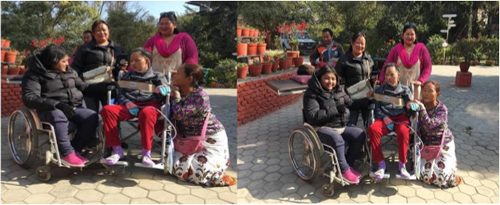
Picture 3: Ms. Devi Acharya is doing peer and family counseling Ms. Subba.
b. Group Peer Counseling:
On 27th December 2018, CIL-Kathmandu conducted group counseling among general members at its office. It was a pleasant moment to welcome general members at the new office for the first time. The counseling mostly focused on sharing past experiences and the challenges faced by peers due to the stigma and attitude of peoples towards disability. Some peers were happy to share their valuable insights and hard work to make their living independent and bright despite the many challenges and difficulties they faced before. During the session, CIL-Kathmandu staffs noticed the financial sufferings of a few general members trying to establish their businesses. CIL-Kathmandu referred them to visit Seven Women Office in Samakhusi. Seven Women is an organization that is actively working in Nepal for empowering women living vulnerable lives. It is believed that Seven Women can support our peers by updating their skills on knitting, cooking and beauty salon skills. Similarly, it is believed that the organization help them to boost their understanding and capacity to run their business successfully.
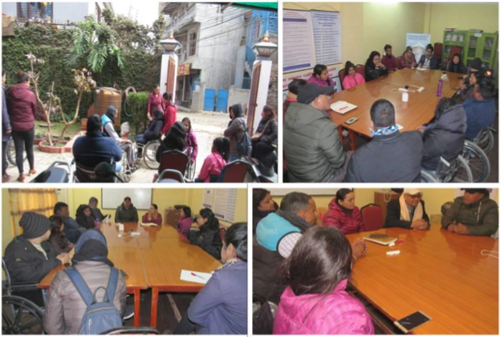
Picture 3: Group peer counseling and gratitude expression event conducted at office of CIL-Kathmandu of 27th December 2018.
C. Expression of Gratitude to Mr. Mohan Tulachan
Same day CIL-Kathmandu expressed its depth gratitude to Mr. Mohan Tulachan for supporting Mr. Madhav for running his small grocery shop in Baneshower. Like Dalit, we living with disability also face lots of challenges to find room to rent and also to get loving house owner who allow us to rent their room or house for leaving and run the business. Mr. Mohan Tulachan house owner of Mr. Madhav not only supported Mr. Madhav Subedi to establish his small grocery shop in Baneshwor area but also supported to raise his business and his family to grow and live independently enjoying their business and living.
4. Three Days International Knowledge Sharing Workshop on Leprosy and Disability:
CIL-Kathmandu, Fairmed, Netherland Leprosy Relief (NLR),Enablement Nepal and Leprosy Mission Nepal jointly launched a three day International knowledge Sharing Workshop on Leprosy and Disability’in Kathmandu starting from 19th to 21st December 2018. The program was hosted by National Federation of Disabled Nepal(NFDN) in partnership with Nippon Foundation.
The workshop provided an introduction of Leprosy, its causes, impacts and the physical, psychological and social consequences of the disease.Leprosy is caused by by Mycobacterium leprae and it is chronic transmitting. This disease mainly challenges the skin, the peripheral nerves, mucosal surfaces of the upper respiratory tract and the eyes. It is not confined in only one age. It can be caused to all ages ranging from early infancy to very old age. Though it is controllable or curable many patient feel afraid because of the stigma associated with the Leprosy. Because of persistent traditional attitudes towards leprosy in Nepal also fearsto visit hospitals and to consume medicine regularly.
Despite the World Health Organizations’ target to eradicate leprosy by 2020, around 3,000 new leprosy patients are diagnosed in Nepal every year. This increasing number of leprosy patients in Nepal has become a challenge though Nepal announced leprosy eradication in 2010. It is believed that the chances of leprosy are higher among women and children in the remote areasdue to easy transmission and delayed diagnosis. The majority of participants reported the challenges associated with the physical impairment and societal attitude after release from regular treatment as well. Women, in particular, suffer from the consequences of discrimination and stigma, as shown by higher unemployment and divorce rates. Depending on their situation, many will need additionalsupport, training in self-care, monitoring and rehabilitation.
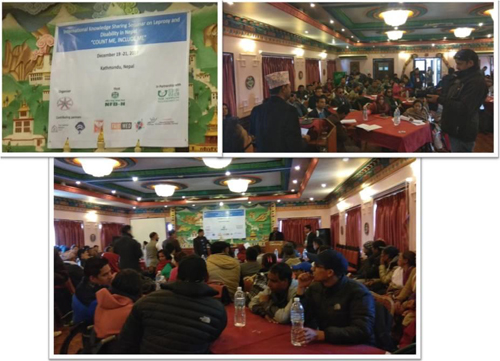
Picture 4: 3 days knowledge sharing among DPOs leaders and Activist in Hotel Marsyangdi
In addition to physical impairment, the stigma of leprosy has a large impact on many people's lives, affecting their physical, psychological, social and economic well-being. Stigma has multiple causes; these should be addressed in partnership with communities and persons affected. One way stigma reduction activities should be launched vigorously and on another socio-economic rehabilitation are urgently needed in addition to strategies to reduce the separation from society to live in isolation which is against humanity and the peoples’ happiness.
Enablement Nepal (EN) reported prevalence rate is particularly high in Banke, Bardia, Nawalparasi and other districts of the Terai. It is also said that the prevalence of leprosy patients is higher in Province 2. Similarly, the EN urged to put hands together to build the capacity of affected individuals and organizations working actively for reducing stigma associated with Leprosy and to strive for an inclusive society where every person can enjoy equal opportunities, participate meaningfully and contribute to the development processes. Mr. Ganesh K.C, president from CIL-Kathmandu reported the physical, attitudinal, technological, communicational and institutional challenges to allow persons with disabilities live independently at their chosen communities.
Nippon Foundation supported NFDN and contributing partners to launch the program among 150 participants. It is believed that knowledge and experience shared by affected persons will enable participants to advocate forreducing challenges and stigma that is associated with leprosy in Nepal and other communities in the world. Delegates from Bangadesh, India and Nepal visited Anandaban Hospital for Leprosy and received information regarding the hospital, experience of patient in communities, rehabilitation activities etc.
5. Independent Living Experience Program:
CIL-Kathmandu partnering with JICA and Iruka, Center for Independent living conducted 7 days of independent living skill development activities to Mr. Bijendra Shrestha starting from 24th December 2018 to 29th December 2018018.
As a child, Mr. Shrestha was diagnosed muscular dystrophy disability. Muscular dystrophy is a condition of physical that cause progressive weakness and loss of muscle mass. In muscular dystrophy, abnormal genes (mutations) interfere with the production of proteins needed to form healthy muscle.
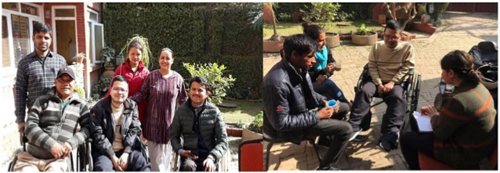
Picture 5 a.: Mr. Bijendra and Mr. Bishnu has similar disability and had individual peer counseling and Mr. Bijendra is sharing experience with interns from different universities
Mr. Shrestha’s parents are from a middle class background. He has three siblings and his mother is65 years old. His father is no longer. His mother has been his primary caregiver for all needed activities for his living. Besides household activities, his mom manages a girls hostel and his elder brother works as a manager in a well established restaurant in Kathmandu.
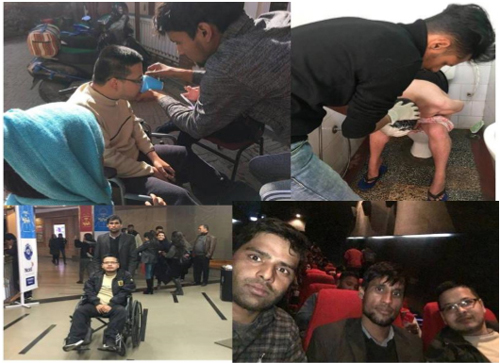
Picture 5 b: Mr. Bijendra learning to be independent by mobilizing personal attendants provided by CIL-Kathmandu
Mr. Shrestha joined CIL-Kathmandu to learn independent living skills. During his stay, he was able to utilize personal attendant (PA) services provided by CIL-Kathmandu to learn more about the role of personal attendants for independent living and for self determination. He also visited a movie theater, went shopping and went sightseeing near to Baneshwor area. During his training, he learnt to cook, wash dishes and clothes and clean the room mobilizing PA services within a barrier free environment. CIL-Kathmandu also supported him with an electric wheelchair that was donated from Lifeline Academy for persons with disabilities, South Korea. Similarly, CIL-Kathmandu referred him for a job in the computer sector so he can earn his own income. CIL-Kathmandu hopes Mr. Shresthawill enjoy an independent life so that he can interact with his community and inspire peers who have been living with similar disabilities and without accessing opportunities.
6. Wheelchair Manufacturing Activities:
CIL-Kathmandu is happy to announce our continued activities for designing and manufacturing wheelchair models utilizing locally available resources. CIL-Kathmandu has established a well equipped wheelchair manufacturing and repair center in Nepal, and was responsible forNepal's first electric wheelchair. We are thrilled to be able to offer these services again and to conduct more research on wheelchair innovation and design. The new workshop has been fitted with the necessary machinery and during the month of Decemberwe progressedthrough the final stages of developing models of two active manual wheelchairs. CIL-Kathmandu is waiting for get well furnished three models of wheelchairs from the workshop.
7. Educational Tour to South Korea:
Ms. Jamuna Subedi, CIL-Kathmandu Secretary General, travelled Seoul in South Korea on 28th November 2018 to undertake interactive meetings with great leaders of Independent Living and to study the disability movement in South Korea. Her 17-day visit was hosted by Life Line academic for persons with disabilities and Mappouchu Indpendent living Center in Seoul.
During her visit, Ms. Subedi was able to visit IRUM building (a government building that Disabled Peoples Organizations are allowed to use to run their activities), Impaung Independent Living Center, Seoul Solidarity Against Disability, Seoul Center for Independent Living and Nodle center for Independent Living where she was able to observe their activities for independent living movement in South Korea. Similarly, she observed demonstration led by progressive leaders from Korean’s Independent Living Centers. These leaders are carrying advocacy for gaining appropriate disability definition and unification on support system. Like existing definition according to Nepalese law, Korean government has also defined and distinguished disability level as 1st, 2nd and 3rd Grade. According to leaders, dividing human body is not proper idea to deal with human needs because the grade system allows government officials to evaluate or examine physical appearance but doesn’t allow to understand human needs and decision making rights of persons with disabilities. During her visit Ms. Subedi came to know that in South Korea still more than 3,000 peoples living with severe disability are living in institution and government should be well prepared to deinstitutionalize them for their rights to live independently within chosen community.
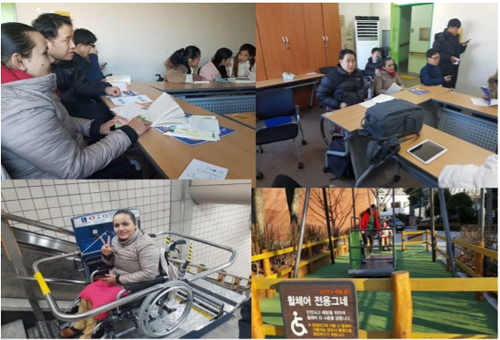
Picture 7: Ms. Jamuna Subedi, Secretary General of CIL-Kathmandu is experiencing interaction meetings with disabled leaders and accessibility in Seoul.
It was an inspiring trip for making strong relationship with Korean Independent living movement leaders and also to hear how much effort they contributed to bring the independent living movement to South Korea by forcing government to make and properly implement the policy on Personal Attendant Services, accessibility, daily living allowances and manufacturing customized and consumer controllable Assistive Devices since 2008. Leaders in Seoul learned from Japan and adopted advocacy strategies and best practices of Japan for their own citizens.
In addition to these fruitful meetings, Ms. Jamuna Subedi experienced easy mobility in public infrastructure and public vehicles that are adopting universal design of accessibility.
8. Discussion for new project proposal:
CIL-Kathmandu hosted a meeting among Nepal Medical Students’ Society (NMSS), Nepal Public Health Students' Society (NPHSS) and National Association of Physical Disabled (NAPD on 28th December 2018. The main purpose of the meeting was to find relevant and realistic areas to work jointly for creating better future of persons with disabilities in Nepal. Representatives from NMSS and NPHSS depicted their high intention to collaborate with disabled peoples’ organizations such as CIL-Kathmandu, National spinal Cord Injury Sports Association (SCISA)and NAPD. It will be the first time for collaboration between both disabled people led organizations and medical students with the intention ofraising awareness regarding medical issues of persons with disabilities and to establish a support system.
Discussions with the students explained what a Disabled People’s Organization (DPO) is and the two models of organizations working to support persons with disabilities: one is charity based in other words for the movement and another is right based or of the movement. DPOs are considered to be within the second category.The discussion also focused on electing a10 member STEERING COMMITTEE for implementing the proposed project and also to carry the study of 10 years Action Plan of the Ministry of Health. This plan aims to find the baseline for advocacy and to empower medical service providers (such as doctors, nurses, volunteers) in all provincial hospitalsand to carry advocacy to influence national level health related policies as well as to influence government so that disability related issue would be included into doctors curriculum for detail information of each types and severity of the individuals living with disability.
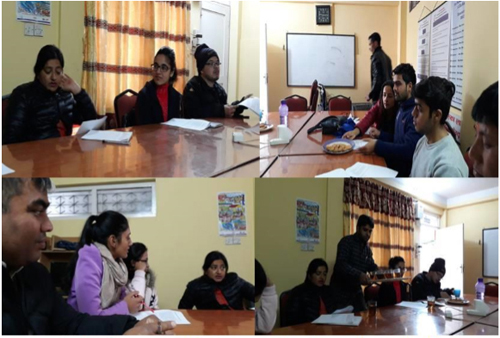
Picture 8: Meeting among DPOs leaders and Medicine and public health students from Teaching Hospital on new project associated with Disability awareness raising.
DPOs have recognized the importance educating service providers about the different types and severity of disabilities so that doctors do not always perceive disability as requiring medical intervention, and so people with disabilities can have physical access to provincial hospitals and health posts as well as establishing relationships with private medical teaching hospitals who can provide training to persons with disabilities so that they can be well established as peer counselor and sign language interpreter at provincial level hospitals. In addition to this, the discussion covered the important role of peer counselors at hospitals so that doctor, patient with disability and support network have better communication and possibility of finding the best suited action for patient’s individual need. Further to hiring sign language interpreters and peer counselors at hospitals, the meeting realized the necessity of having easy to read IEC material, radio program, audio version jingles, animated videos etc. on Sexual and Reproduction Health of Women with Disabilities (including education on contraceptives, access, use and precautions), mental health and aware local people and volunteers about acute phase (transferring) and educating about best use of the locally available resources.




